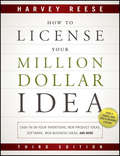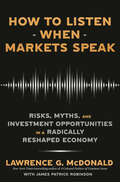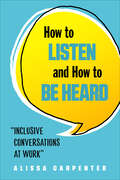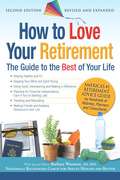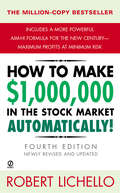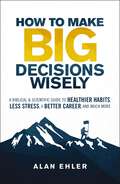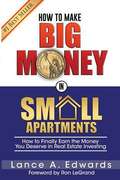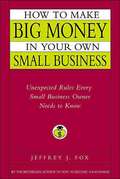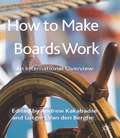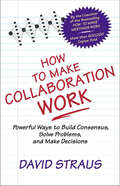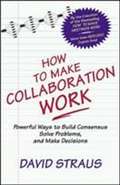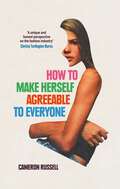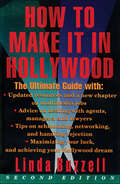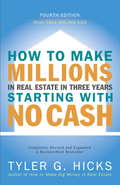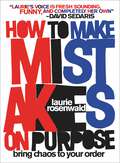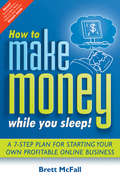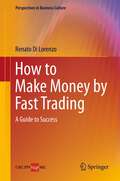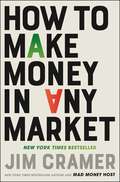- Table View
- List View
How to License Your Million Dollar Idea
by Harvey ReeseThe classic guide to cashing in on your million-dollar ideaWhether you've invented a great new product, or you have an idea for an app, an online business, or a reality show, How to License Your Million Dollar Idea delivers the information you need to snag a great licensing deal. Now in its third edition, this book has become the go-to source for budding inventors and entrepreneurs who have great ideas and want to cash in on them without putting themselves in financial risk. Licensing is the way to make that happen and this book explains exactly how it's done.You'll get tested advice on how to protect your ideas and find a licensee for new products, apps, TV game shows, websites, software, and more. You'll also learn how to develop your creative thinking skills and objectively evaluate your ideas.Explains how to protect your new idea with or without patents and copyrightsDirects you in finding the perfect person at the right company and on how to prepare a presentation that gets you to a "yes"Reviews sample licensing contracts to help you understand what your creativity and achievement entitles you toYou'll also read accounts from profitable inventors on their own goof-ups and brilliant moves along their paths to success.
How to Listen When Markets Speak: Risks, Myths, and Investment Opportunities in a Radically Reshaped Economy
by Lawrence G. McDonaldA New York Times bestselling author and leading expert on market risk argues that seismic shifts in the global economy will trigger a multi-trillion-dollar migration of wealth, outlining new rules of investing for the forward-thinking. &“I can&’t tell you how much I learned from How to Listen When Markets Speak. The historical perspectives and insights are something every investor needs to know. Buy this book.&”—Mark Cuban From Wall Street to the White House, the fantasy of an eventual &“return to normal&” is still alive and well, nurtured by dangerously outdated theories. But the economic world as we know it—and the rules that govern it—are over. In the coming decade, we&’ll witness sustained inflation, a series of sovereign and corporate debt crises, and a thundering of capital out of financial assets into hard assets. Few are prepared. Lawrence G. McDonald, founder of the economic research platform The Bear Traps Report, got a real-world education in market risk when, as a Lehman Brothers VP, he watched the firm ignore flashing warning signs before its collapse. His analysis led him to identify twenty-one indicators for gauging the health of an economy and detecting early signals of opportunity and danger. In How to Listen When Markets Speak, McDonald unveils his unique predictive models, connecting surprising dots between past, present, and future and outlining actionable trading ideas for staying a beat ahead of the markets. Readers will learn: • How disastrous Fed policy will collide with an increasingly fragmented geopolitical landscape to keep U.S. inflation near 3-5% for the next decade • How growing demand for oil and gas, underinvestment in urgently needed energy infrastructure, and cozy Russia–Saudi Arabia relations will lift the base price of energy to historic levels • Why hard assets and rare minerals like lithium and cobalt will outperform growth stocks, U.S. treasuries, and overcrowded passive investment strategies—how to detect bearish and bullish trends in advance • How passive investing and the vehicles intended to democratize finance have fueled bubbles and ideological skew by large market participants, leaving millions of 401(k)s and IRAs at risk • Why America will likely lose its position as a global superpower and holder of the world&’s premier reserve currency, and may be forced to slash Social Security, Medicare, and military spending Rather than merely doomsaying, How to Listen When Markets Speak equips readers to make sense of our current moment, resist reactionary narratives and baseless analysis, and preserve their wealth in turbulent times. When markets speak, it pays to listen.
How to Listen and How to Be Heard: Inclusive Conversations at Work
by Alissa CarpenterA straightforward guide to communicating more effectively on the job and building a more inclusive, creative, and productive workplace.How to Listen and How to Be Heard is a guide to empowering yourself and others to communicate with people who think, act, and experience things differently than you do. It’s also guide to communicating with more confidence, candor, and authenticity. Too often, people avoid difficult conversations, but these discussions often need to happen to bring people together so we can all succeed.There are so many different perspectives and experiences being brought to the table. And the best employees and leaders know that harnessing the power of these differences will build stronger teams, ideas, and organizations.How to Listen and How to be Heard shows you how to bridge the conversation gap and use your unique voice to start powerful conversations. Learn how to communicate with, through, and alongside what makes us different. We are all here to work together, so let’s get started.Praise for How to Listen and How to be HeardBest Nonfiction Book of 2020, Cosmopolitan“Gets to the heart of communication issues at work. Using Alissa Carpenters techniques, your workplace will be more inclusive, creative, and productive.” —Dorie Clark, executive education professor at the Duke University Fuqua School of Business, author of Reinventing You and Stand Out“The working world is a more diverse place than ever before. Open dialogues are a must and lead to innovation and harmonious teams. Alissa Carpenter provides a guide to successful communication in the workplace.” —Dan Schwabel, author of Back to Human, Promote Yourself, and Me 2.0“Carpenter offers useful insight on starting tough conversations. Many practical and actionable suggestions throughout the book make it a valuable read for anyone interested in working on their communication practices.” —Library Journal
How to Live Your Best Life: Transform your mindset and manifest real success
by Maria HatzistefanisIt's time to reset, adjust and take the power back.Having spent over 20 years building her hugely successful beauty empire, Maria Hatzistefanis managed to achieve all her childhood dreams and goals. She has attended exclusive parties, walked on glamorous red carpets and visited beautiful cities. Whilst this life of glamour and success is exhilarating, Maria is shocked to find that the happiness it brings is fleeting. This leads her to realise that her life needs a new focus. In this easy to follow guide Maria asks the fundamental question 'what is happiness?'. Analysing her own experiences, failures and fortunes, Maria provides clear, concise and intuitive strategies to help you tackle your own challenges. From aligning your thoughts and actions to detaching your success from achievements, Maria shares her practical secrets to mastering your mindset. How to Live Your Best Life will equip you with the tools you need to be in control of your own destiny. Brimming with good sense, great advice and clear tips Maria guides you on your journey to happiness and ultimately success.
How to Love Your Retirement
by Hundreds of Heads Books Barbara WaxmanReady or not, here it comes: your retirement years! The third phase in your life.You can look forward to good and interesting times if you're prepared, and Love Your Retirement is packed with helpful, entertaining stories and lots of real-life advice from hundreds of retirees who are making the most of their golden years.Love Your Retirement lets readers learn about the NEW retirement: the un-retirement, Protirement, encore experience, from renewment trailblazers. It will introduce the exciting possibilities about how to think about and experience retirement and to hear from 'hundreds of heads' who are doing it in this new and satisfying way.Stories are:* Inspirational* Funny* Touching* EducationalAmong the topics covered:-How to pick the best time to retire-Home again: learning to live with your spouse 24/7-A new life: starting fresh in business, love, and family-Back to school--it's more than being Old Person On Campus-Footloose: traveling your days away-Health: how to stay fit and beat the insurance system-Grandkids: how to be the best grandparent in the world-Volunteering and Working: staying busy and productive
How to Love Your Retirement
by Hundreds of Heads Books Bob Mendelson Barbara WaxmanHow to Love Your Retirement shows the baby-boom generation how to plan for, and succeed at, this statge of life, whether relaxation, travel, education, or even a new occupation is the goal. Packed with helpful, entertaining stories and real-life advice from hundreds of retirees who are making the most of their post-work lives, this honest and useful guide covers such topics as how to pick the best time to retire; learning to live with a spouse 24/7; staying fit; starting fresh in business, love, and family; traveling; going back to school; and more.
How to Make $1,000,000 in the Stock Market Automatically
by Robert LichelloYou don’t need to be a stock market expert. You don’t need to be a math whiz. You don’t even need a big bankroll. All you need is AIM. Automatic Investment Management. The money machine that takes the uncertainty out of investing-and teaches you how to make money in the market. Trusted by thousands of investors worldwide since 1977, this bestselling classic reveals Robert Lichello’s revolutionary formula for earning profits in stocks and mutual funds-automatically. Unlike other investment strategies that focus on stock selection, AIM relies on timing-and is designed to work in any kind of market with any size investment. Lichello originally developed AIM in response to the heartbreaking collapse of the great bull market of the 1960s-and today his ideas are more relevant than ever. AIM is easy, dependable, and it works. Simply put, it’s a money machine-just waiting to be turned on. Now Lichello has updated AIM for today’s market. Reformulated as AIM-HI (AIM High Intensity), AIM-HI will do for you what it has already done for millions…
How to Make Big Decisions Wisely: A Biblical and Scientific Guide to Healthier Habits, Less Stress, A Better Career, and Much More
by Alan EhlerOur decisions determine our lives. Invest in a company that goes bankrupt and you lose your life savings. Say the wrong thing in an interview and you miss the job of the lifetime. Make no decisions and you miss every opportunity. In today's rapidly changing world, the cost of poor decisions (and no decisions) is higher than ever.In How to Make Good Decisions Wisely, author and scholar Alan Ehler lays out a clear approach to making big decisions based on the Bible and recent discoveries in neuroscience and decision science. He presents a simple, four-step process that can be followed to make any kind of decision, whether personal, professional, or relational.Making big decisions can rewrite lives, careers, families, churches, and businesses. A lot is at stake. Learn how to choose well.
How to Make Big Money in Small Apartments: How to Finally Earn the Money You Deserve in Real Estate Investing
by Lance Edwards Ron LeGrandThis book reveals how anyone can skip the competition and get started with small apartments - whether new or experienced. Through detailed explanation and over 40 case studies, you'll learn how to make money by wholesaling, buying, and/or rehabbing small apartment buildings - using none of your own cash or credit, and with no prior experience. You will discover the step-by-step approaches for finding deals, qualifying deals, finding buyers, finding investors and monetizing your small apartment deals; plus how to scale-up to larger apartments. This book contains the know-how and the motivation for you to jump to the fast lane and start doing small apartment deals now. Since 2002, when he bought his first small apartment nothing-down, Lance Edwards has done apartment deals ranging from 3 units to nearly 300 units. And since 2007, he's also been teaching others how to escape the rat race faster and play bigger - by starting with small apartments.
How to Make Big Money in Your Own Small Business: Unexpected Rules Every Small Business Owner Needs to Know
by Jeffrey J. FoxEver dream of starting your own business? According to USA Today, more than 47 million people want to own their own businesses and over 20 million actually do. In How to Make Big Money in Your Own Small Business, bestselling business author Jeffrey Fox offers sound rules to succeeding in small business, whether you're running a bookstore, consulting business, or restaurant. In short chapters that range from administration and cash flow to marketing and hiring, Fox reminds entrepreneurs what's important and what's not, what makes a business succeed, and what causes it to fail.
How to Make Boards Work
by Andrew KakabadseFrom a global overview of governance and why have boards in the first place to the critical leadership skills of the Chairman, this book offers a unique collection of original contributions that are intellectually riveting and distinctly useful for board directors. This is no mean feat, bearing in mind the scandals that have bedeviled corporations and governments. How to Make Boards Work captures latest governance thinking and research whilst simultaneously addressing the theory and practice of board directors relations. The role and contribution of boards is scrutinized within the broader framework of global, social and political complexity. Clearly arguing for the need to reinvent boards, the book's groundbreaking contribution offers latest thinking and global research on the skills, knowledge and qualities necessary for the high performing board and board director. The integration of monitoring through governance codes with the necessary leadership of the directors, capture the nature of the high performing global board. From why have boards, to what to do on boards, this unusual collection is the board directors' guide to sustainable value creation.
How to Make Collaboration Work: Powerful Ways to Build Consensus, Solve Problems, and Make Decisions
by David A StrausEvery day we work with others to solve problems and make decisions, but the experience is often stressful, frustrating, and inefficient. In How to Make Collaboration Work, David Straus, a pioneer in the field of group problem solving, introduces five principles of collaboration that have been proven successful time and again in nearly every conceivable setting. Straus draws on his thirty years of personal and professional experience to show how these principles have been applied by organizations as diverse as Ford Motor Company, the U.S. Environmental Protection Agency, Harvard Business School Publishing, Boston Public Schools, Kaiser Permanente, the city of Denver, and many others. How to Make Collaboration Work shows how collaboration can become a joy rather than a chore-a kind of chemical reaction that releases far more energy than it consumes.
How to Make Collaboration Work: Powerful Ways to Build Consensus, Solve Problems, and Make Decisions
by David StrausEvery day we must work with others to solve problems and make decisions. Yet these efforts at collaboration often leave us frustrated, angry and exhausted, and end up taking too much time.
How to Make Herself Agreeable to Everyone: 'A book of real power' ? STYLIST, Best Non-Fiction Books of 2024
by Cameron RussellThe realities of the fashion industry exposed in this devastating account of the life of a successful supermodel. 'A unique and honest perspective on the fashion industry... Cameron doesn&’t just hold the door open for more voices from within fashion, she makes a compelling argument as to why they must be heard.' CHRISTY TURLINGTON BURNS Scouted by a modelling agent when she was sixteen years old, Cameron Russell approached her job with scepticism. She was a precocious and serious student with her sights set on college — not the runway. But modelling seemed to offer young women like her access to wealth, fame, and influence. Besides, as she was often reminded, there were 'a million girls in line' to replace her. A ferocious, visceral memoir, How to Make Herself Agreeable to Everyone chronicles how Russell learned to navigate the dizzying space between physical appearance and interiority, and making money in an often-exploitative system. *** 'A book of real power.' STYLIST, Best Non-Fiction Books of 2024 'Russell&’s voice is steady and compelling throughout, offering young women, especially, a thoughtful and powerful way through.' PEGGY ORENSTEIN, author of Girls & Sex 'Compelling, smart and insightful.' VENETIA LA MANNA, host of All The Small Things 'Unforgettable... Fiercely intellectual, deeply vulnerable, and unapologetically honest, Russell reads through the layers of gender, race, capital, and exploitation in the fashion industry.' IMANI PERRY, author of South to America
How to Make Huge Cash with Section 8 Rentals: The Landlord Handbook
by Ernie BraveboyLearn the best way to make money investing in section 8 rentals). This book gives you the exact details on how to find, analyze, and manage section 8 rental properties. Where other books lack the details on how to actually make money with section 8, this book is all about the details. It is written by someone who has been investing in real estate for over 15 years and is still investing today.would you like to get guaranteed rent would you like to get the best tenants , this book will teach you how to pass section 8 inspection, or how to buy with little cash, this books tells you how to overcome those obstacles. If you can't find your answer in the book, ernie even gives away his email address where you can ask him directly.if you want to be successful in real estate without problem tenants and get your rent on time you need this book.
How to Make It in Hollywood: The Ultimate Guide
by Linda BuzzellRenowned psychotherapist and career counselor Linda Buzzell is the expert in knowing how to create and develop a career in Hollywood. With this book, she shows you how to look at your personality, your strengths, your weaknesses, your special skills, and your talents in order to target your personal goals and maximize your career success. She then explains all the jobs in Hollywood and how to find them, get them, and advance through each stage in your career.How To Make It in Hollywood includes everything you need to know about agents, managers, lawyers, the casting couch, chutzpah, schmoozing, networking, Godfather Calls, rhino skin, Power Rolodexes, handling rejection, constant unemployment, and keeping yourself on the track to your dreams when real life keeps telling you to give it all up and move back to Cincinnati!
How to Make It: 25 Makers Share the Secrets to Building a Creative Business
by Erin Austen AbbottTwenty-five creative entrepreneurs reveal how they found success, offering advice and inspiration for those hoping to follow suit or find a new hobby.This is the ultimate tell-all, show-all guide to making a living by making things. Featuring twenty-five profiles of illustrators, jewelry designers, ceramicists, painters, clothing designers, and printmakers, How to Make It provides a behind-the-scenes look at the daily rituals and best practices that keep these creative entrepreneurs on track. With Q & As, insider tips, and DIYs from each maker, these pages offer guidance and encouragement to artists just starting their careers and to professionals looking to take their creative business to the next level. Brimming with practical advice and inspiration, this book is a perfect gift for anyone interested in making it as a maker.Praise for How to Make It“Readers curious about starting a creative business will find these 25 interviews with artisans an entertaining introduction to the challenges and rewards of turning art into a livelihood . . . . In addition to photographs of the artists at work, the book includes craft projects developed by the artisans for beginners, giving the book a broader appeal to readers dreaming of giving up their nine-to-five jobs or just considering new hobbies.” —Publishers Weekly
How to Make Millions in Real Estate in Three Years Starting with No Cash (Fourth Edition)
by Tyler HicksA fully revised BusinessWeek bestseller that will help even beginning investors cash in on the 21st-century real estate boom.
How to Make Mistakes On Purpose: Bring Chaos to Your Order
by Laurie RosenwaldBased on Laurie Rosenwald's popular workshop, How to Make Mistakes On Purpose reveals an intuitive, entertaining way to come up with truly original ideas. Three generations of humans have now been molded into results-oriented workers who cannot mess up, and therefore may never innovate either. Shared software, skills, and experiences equal no surprises. Surrounded by the unwavering, reliable results made possible by a machine, we all marinate in this ubiquitous cybersauce. Behold! Thousands of shiny new apps, sites, products, and services that look, feel, and are essentially the same. Because computers don&’t make mistakes.Chance is the natural foil to the digital. We combine both for originality. This makes for the kind of exciting, hopeful future we want. We embrace technology but need to slap it around a bit to get someplace new.Human error sparks connections. In a relaxed situation where one&’s hypercritical demons are AWOL, the snap, crackle, pop of brainstorms happen all around us.A fresh, colorful guide to discovery, with clearly marked directions and witty prompts, this is a book about living a productive, individualistic life. Whatever your job, it gives you a way to zig while everyone around you can only zag. It will also make you laugh along the way.
How to Make Money Using Etsy
by Timothy AdamIn a world where most products are manufactured by machines, Etsy offers an online platform for makers of handmade products and crafts to market and sell their goods to a vast network of buyers who demand unique, genuine products. To date, the site has attracted over 400,000 sellers who collectively have sold over 30 million items, generating more than $180.6 million in revenue. The only resource of its kind, How to Make Money Using Etsy--written by Tim Adam who has successfully been selling his products all over the world through his Etsy shop since 2007--guides readers step-by-step through the many stages of selling online. How-to topics include:Establish your Etsy shopEffectively photograph your productsPost your products to optimize visibility and increase salesBrand your businessUse social media like blogs, Twitter, and Facebook to connect with buyers and grow your business
How to Make Money While you Sleep!
by Brett McfallIn this jargon-free guide, author Brett McFall shows just how easy it is to set up your own online business. You'll discover how to make money by delivering a great deal of value without a great deal of effort. And you don't have to have a technical bone in your body to do it!In seven simple steps, Brett takes you through everything you need to know to create a successful online business on a shoestring.Inside you'll learn how to:find a niche marketcreate a productwrite an enticing sales messagedesign a websitesell your product.Packed with useful tips, tools and techniques for setting up and maintaining an online business, How to Make Money While You Sleep! is a must-read for budding entrepreneurs.
How to Make Money With Real Estate Options
by Thomas LucierSpend like a miser, profit like a mogulWho says you have to spend money to make money?Savvy real estate investors follow the examples of Donald Trump and Walt Disney, turning substantial profits on properties without incurring the debt, risk, and maintenance costs of ownership--and now, so can you!In How to Make Money with Real Estate Options, real estate expert Thomas Lucier introduces you to the low-risk, high-yield investment vehicle that can earn big bucks even for small investors. Lucier explains what real estate options are, how they work, and why they are the tools of choice for thousands of successful investors. Step by step, he shows you how to:* Locate potential option properties using the Internet, want ads, and "bird-dogs"* Contact and negotiate with property owners* Perform due diligence and avoid options pitfalls* Prepare an option agreement that protects you* Insure real estate options with title insurance* Package and sell optioned properties for optimum profitsPacked with no-nonsense advice on how to identify the most profitable properties and manage every step of the option process, How to Make Money with Real Estate Options is a practical guide to one of the secret weapons of savvy investors.
How to Make Money as an Artist: The 7 Winning Strategies of Successful Fine Artists
by Sean MooreHow to sell one's art isn't taught in art schools, yet it's an essential ingredient in getting work displayed and attracting art commissions. This straightforward guide is written for artists who want to present themselves and their work in the best possible light to the largest possible audience. Topics include creating a winning marketing package, getting a gallery, finding an artist representative, and obtaining free or low-cost advertising. Also included is a thorough resource listing that includes inexpensive sources for slide development, contact information for artist representatives, suggestions for durable mailing packaging, and contact names for foreign news media.
How to Make Money by Fast Trading
by Renato Di LorenzoAll over the world a growing number of people are viewing trading the markets as a valuable source of additional income or even as a new career option. Sitting in front of a PC, they are able to connect to their broker's trading platform and buy or sell on the world market assets of all kinds: gold, oil, shares, bonds, and so forth. Today, it is no longer a problem to "be short" on almost any class of asset. This book is an ideal guide on how to make money by fast trading. It will be especially valuable for those wishing to trade in their spare time with a limited amount of capital. Different styles of trading, including scalping, day trading, and swing trading, are clearly described, with advice on how to avoid common mistakes. In addition, the "Donkey" trading system - a system designed for everybody - is fully explained. Using this book, the reader will learn how to manage risk safely, maximizing the likelihood of success.
How to Make Money in Any Market
by James J. CramerRenowned personal finance expert, bestselling author, host of CNBC&’s Mad Money, and cohost of Squawk on the Street Jim Cramer returns with how to make money in any market for every investor.Except for the one percent of the one percent, nobody learns how to make your money grow in the stock market. Jim Cramer has spent his career determined to change that. Now a household name after twenty seasons of Mad Money with Jim Cramer, cohost of Squawk on the Street, and host of CNBC&’s Investing Club, Cramer shows you how to get rich by understanding the market and investing in the right growth and income stocks—ones that he can help you identify. How to Make Money in Any Market is your guide to overcoming your fear about investing, to be able to make bigger money with what you have, no matter how small—in any market.
